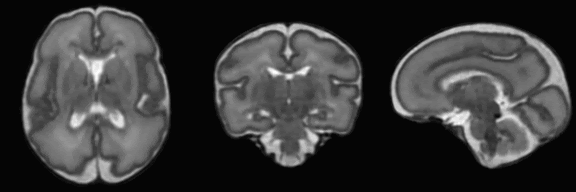Tensorflow 2 code repository for Generative Adversarial Registration for Improved Conditional Deformable Templates, arXiv 2021.
train_script.py is the main template construction script
that implements all methods considered in the paper for the 3D datasets.
The current code repository will be heavily refactored (e.g., improving data loading, better abstraction) in the coming days and weeks. FFHQ-Aging scripts only require a change from 3D to 2D and will be added as well.
We recommend setting up an anaconda environment and installing all dependencies as,
conda env create -f environment.yml
conda activate atlas-GANExample training call for conditional templates:
python conditional_script.py --name phd-ours-cond --dataset pHD --oversample --nonorm_reg --clip --losswt_gp 5e-4 --gen_config oursCLI args are:
usage: train_script.py [-h] [--epochs EPOCHS] [--batch_size BATCH_SIZE]
[--dataset DATASET] [--name NAME] [--d_train_steps D_TRAIN_STEPS]
[--g_train_steps G_TRAIN_STEPS] [--lr_g LR_G] [--lr_d LR_D]
[--beta1_g BETA1_G] [--beta2_g BETA2_G] [--beta1_d BETA1_D]
[--beta2_d BETA2_D] [--unconditional] [--nonorm_reg] [--oversample]
[--d_snout] [--clip] [--reg_loss REG_LOSS] [--losswt_reg LOSSWT_REG]
[--losswt_gan LOSSWT_GAN] [--losswt_tv LOSSWT_TV] [--losswt_gp LOSSWT_GP]
[--gen_config GEN_CONFIG] [--steps_per_epoch STEPS_PER_EPOCH]
[--rng_seed RNG_SEED] [--start_step START_STEP] [--resume_ckpt RESUME_CKPT]
[--g_ch G_CH] [--d_ch D_CH] [--init INIT] [--lazy_reg LAZY_REG]With verbose descriptions:
CLI args:
epochs: int
Number of epochs to train for.
batch_size: int
Batch size for training. GPU memory typically only allows small batches
dataset: str
Dataset of interest. Currently one of {'dHCP', 'pHD'}
name: str
Name of experiment. Will be prepended to saved folders.
d_train_steps: int
Number of discriminator updates in each GAN cycle.
g_train_steps: int
Number of generator updates in each GAN cycle.
lr_g: float
Learning rate for generator.
lr_d: float
Learning rate for discriminator.
beta1_g: float
Adam beta1 parameter for the generator.
beta2_g: float
Adam beta2 parameter for the generator.
beta1_d: float
Adam beta1 parameter for the generator.
beta2_d: float
Adam beta2 parameter for the discriminator.
unconditional: bool
Whether to train conditional/unconditional templates.
nonorm_reg: bool
Whether to use instance normalization in registration branch.
Not used in the paper.
oversample: bool
Whether to oversample rare ages during training.
d_snout: bool
Whether to apply Spectral Norm to the last layer of the Discriminator.
clip: bool
Whether to clip the template background during training.
reg_loss: str
Type of registration loss. One of {'NCC', 'NonSquareNCC'}.
losswt_reg: float
Multiplier for deformation regularizers.
losswt_gan: float
GAN loss weight in generator loss.
losswt_tv: float
Weight of TV penalty on generated templates.
Not used in paper.
losswt_gp: float
Gradient penalty for discriminator loss.
gen_config: str
Template generator architecture. One of {'ours', 'voxelmorph'}.
steps_per_epoch: int
Number of steps per epoch.
rng_seed: int
Seed for random number generators.
start_step: int
Step to activate GAN training (as opposed to just registration).
Not used in paper. GAN training is active from the first iteration.
resume_ckpt: int
If >0 then resume training from given ckpt index
g_ch: int
Channel width multiplier for generator.
d_ch: int
Channel width multiplier for discriminator.
init: str
Weight initialization. One of {'default', 'orthogonal'}.
lazy_reg: int
Calculate/apply gradient penalty only once every lazy_reg iterations.
Not used in the paper.The training script expects data points to be in the form of npz files. To construct a usable npz from a nifti file, the following code snippet was used:
import numpy as np
import SimpleITK as sitk
simg = sitk.ReadImage('/path/to/nifti.nii.gz')
npy_img = sitk.GetArrayFromImage(simg)
# Assuming that you have 'age' and 'attribute' loaded:
np.savez_compressed(
'./data/dataset_name/train_npz/fname.npz',
vol=npy_img,
age=age,
attribute=attribute,
)We recommend inspecting L196-L238 of train_script.py and ./src/data_generators.py
for more details of how to modify the data loaders for your use case.
This repo makes extensive usage of the VoxelMorph library.
